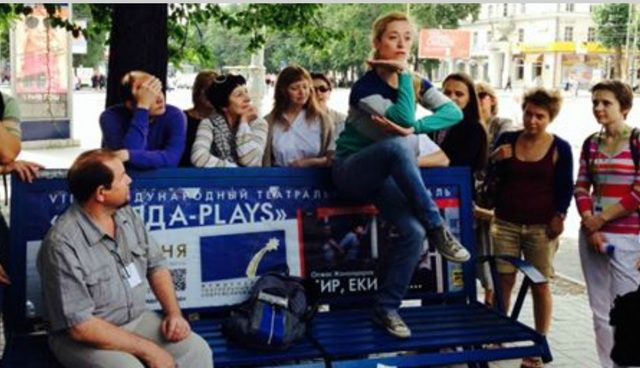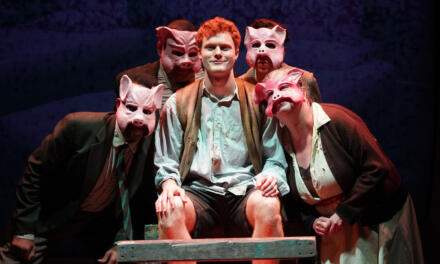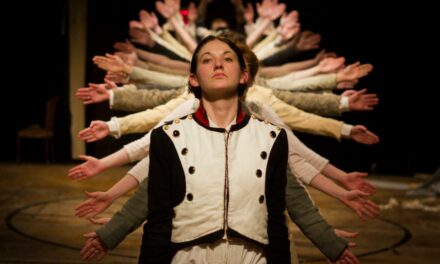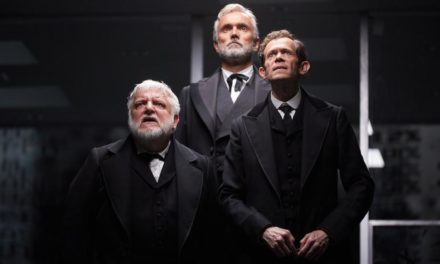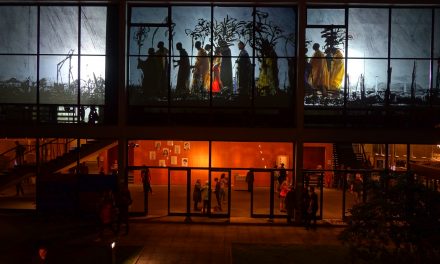Raphael Schklowsky writes about Nicole Kontolefa, an American actress trained in Russia, who is premiering the late Russian playwright, Aleksandra Chichkanova’s experiential play, I Am Me.
A Phoenix in the Park
The mythical Phoenix represents rebirth and renewal; the magic bird ends in its own beginning and begins anew amongst its ashes. In the fall of 2013, in Prospect Park, Brooklyn, I witnessed a resurrection, in the form of a poetic, funny, haunting, philosophical new play. I Am Me was performed by a professional actor for the public for the first time, and at that moment, unbeknownst to the spectators (who were sometimes called upon to be performers themselves), the soul, memory, and legacy of an author was revived in the form of a theatrical performance.
But before I go any further, some background is in order.
I Am Me was written by a woman named Aleksandra Chichkanova, born in Nizhny Tagil, Russia; although she was born in the town when it, along with another sixth of the earth’s surface was the USSR. Writing from experience, I can say that growing up as an artist or someone who examines the world with a critical eye can be rough. From my time living in Russia (almost 5 years from my late-teens to early mid-twenties), I can imagine growing up a young creative in the decay and eventual ruin of the collapse of the Soviet Union in a provincial and industrial city must have been uniquely challenging. She pursued playwriting in Yekaterinburg, and seemingly found her place at the Kolyada Theatre under the wing of the theater’s founder by the same name. Her plays were published, at least one was performed. All of this is to say, Aleksandra Chichkanova -Sasha or Sashenka to those who knew and loved her- committed suicide by hanging herself in December 2012, just a few days before her 30th birthday. She continues to be listed as a staff member on the Kolyada theatre’s website as Executive Director.
A Fire From The Ashes
But like the Phoenix being born from the ashes, it was Sasha’s untimely death that ignited a flame within a Russian-trained American-born actor by the name of Nicole Kontolefa. At that time, Nicole had already been preliminarily developing “I am Me” for performance. She had gotten permission from the author to perform the play, and even corresponded with Chichkanova if she had questions about the material. But the pieces had yet to come together. Whether out of guilt, indebtedness, bravery, or simple gratitude, Nicole decided to perform “I am Me”, come what may. What emerged from her eventual performance in the fall of 2013 was not only a production that honored the memory of Aleksandra Chichkanova by its very existence but began to a write a bright, hopeful and inspirational epilogue to a story that ended in tragedy. From the ashes, light springs forth.
The play, first published in Russia in 2004, is not a traditional play by any means. It doesn’t have any explicit characters, nor does it have a clear play structure. The text is more of a monologue than a play. Ostensibly, we (the audience) are being talked to by an actor. The play’s translator into English, noted writer and critic of Russian drama, John Freedman, spoke to me in March of 2014, following a dress rehearsal of I Am Me at the Golden Mask Festival in Moscow. “(Translating the play) was something of a fluke,” Freedman told me, “I’d fallen out of translating.” But there was something particularly intriguing to Freedman about the play: “It’s not a play in the way people think plays should be plays.”
The model of the production is mobility and flexibility. Kontolefa, the only actor (at least at the beginning of the show) meets a group of people in a pre-designated spot. From there the group is taken on a brief journey – both through the text of the play and physically through a space – and then left in a different place from where they started. But performing in a public place presents some unique challenges, most of which are completely unavoidable. For example, during one performance which I attended (or participated in?), a homeless man occupied a bench not far from where Nicole had presumably planned to perform. Instead of freezing, or tensing up, or doing some other completely understandable action, without skipping a beat she welcomed the gentleman into the space with her attention as if to say: “you’re part of the show now.” This was a play we were watching, but it was real life as well because nobody knew (including the actor) what would happen next. The homeless man just watched in admiration (as did the rest of us) as Nicole continued to travel down the proverbial road of I Am Me. Those types of moments are so rare in theatre these days (or in my mind, ever), but they are somehow commonplace in Kontolefa’s production. Freedman made the keen observation to me during our interview that, “You don’t get a whole lot of opportunities in your life, no matter how good you are, to really set yourself apart… And this project for (Nicole) is one of those (opportunities).”
I’ve heard a certain cliché many times: “theatre is so special because every performance is new and different.” I’ve even heard myself say it. Back in my conservatory days, my classmates and I would chant Stanislavsky’s mantra “Here, today, now!” before every performance. While in principle true, the cliché hardly rings true in the 8-shows-a-week model of theatre being practiced here in New York and elsewhere. People pay to see a product. If the product varies too much, is it still the same product? But what I find so unnervingly captivating about “I am Me” is exactly that: a product that is shaped by the journey, every time. Yes, there’s a script. But beyond that, beyond the bones of the play, a new story is born in the moment, flourishes for a few brief moments then abruptly ends, leaving the audience wondering, questioning, reflecting.
Spreading Her Wings
In the year since the world premiere of I Am Me last year in Prospect Park, Nicole has taken the production itself on a journey. She performed her one-woman show, in Russian, in Moscow as a part of the Golden Mask Festival’s New Play Project. In our interview following the dress rehearsal, John Freedman remarked to me, “I don’t know if she realizes this, but (Nicole) has two world premieres of this show (English and Russian versions) under her belt.” Freedman continued, “I found myself, in the course of the performance, really excited by the idea of an American actor coming to Russia with this play that nobody in Russia has ever done.”
Following the Golden Mask Festival, Nicole and I Am Me journeyed to Yekaterinburg, the playwright’s home town, under the auspices of the Kolyada Plays Festival. The play was not only well received by those who knew and loved Chichkanova the most, but a jury of critics from around Russia unanimously selected it for the Grand Prize. When I recently asked Nicki why she thought the play was so well received, Nicole told me, “I think they were most struck by the earnestness, and openness, and freedom of it.” The show I watched left me simultaneously wondering what exactly it was that I had just been a part of, and wistfully hoping (with a fair amount of doubt) that I’d ever experience anything like it again.
Now back in the States, Nicole is ramping up for another New York area run. With the show’s journey (and successes) abroad providing a strong creative tailwind, Kontolefa is looking to bring new insight into the material, new locations (two in Manhattan, two in Brooklyn), and new experiences for audiences. Although the performances may be unpredictable in nature, one thing is constant: the fire that was lit from a pile of ashes is burning hotter and brighter than ever.
Raphael Schklowsky was born and raised in Brooklyn, NY, and graduated from the LaGuardia H.S. Drama Dept. and the Moscow Art Theater School-Studio. After co-founding Studio Six Theater Company with his fellow Moscow Art classmates, Raphael has since spent six years in the legal field as an advocate, paralegal, and witness consultant. He is currently a Masters Degree candidate at the City College Educational Theatre Program.
This post was written by the author in their personal capacity.The opinions expressed in this article are the author’s own and do not reflect the view of The Theatre Times, their staff or collaborators.
This post was written by Raphael Schklowsky.
The views expressed here belong to the author and do not necessarily reflect our views and opinions.

